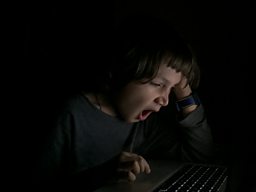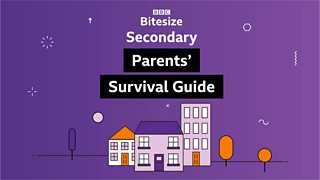5 ways to bust through screentime arguments with your kids

Even before lockdown, screens have been creeping into more and more areas of our lives. We sit in front of computers to work and then simply switch to personal laptops to stream shows, films or sports to relax - taking a break every once in a while to chat to friends on sundry apps.
All of this has been exacerbated by lockdown - and is even more relevant for teenagers, a generation for whom digital lives are second nature.
On the latest edition of the Bitesize Secondary Parents' Survival Guide, which has been guiding parents through this pivot to home learning, Deborah James and Jonathan Overend tackle this issue with the help of psychotherapist and author Dr Aaron Balick - who has a few easy suggestions for listeners.
1. Not all screens are created equal
Firstly, it's important to note that screentime is, in and of itself, not necessarily a problem that needs to be fixed. Indeed, a key shift for parents and children alike is in their own perception of it.
A blanket approach to "screentime" is unhelpful
For teenagers, screens mediate not only their education but more importantly their social relationships - so a blanket approach to "screentime" is unhelpful when they are not simply "using their screens" as a homogeneous activity but rather doing a multiplicity of activities via screens.
Some are healthy, some not: Dr Balick draws a distinction between, say, seven hours of watching pornography versus seven hours split between online learning, social networking and creative projects.

2. Break it up
That said, there are issues with unmitigated screentime, and it's important to zero in on what those actually are. Screens are hard on the eyes and hard on the brain when used for too long a period.
Smaller chunks of screentime are key
So while seven hours of screentime used for productive activities may be acceptable in one day, it's still not necessarily healthy in one block. Children and adults alike should take breaks away from the screen and make sure to exercise regularly. Smaller chunks of screentime are key, particularly in a period where all of us are more reliant on them to work and relax.
Moreover, screentime at night can particularly affect teenagers, whose circadian rhythms are different from those of adults, by disrupting their sleep patterns.
3. Take a dose of your own medicine
While instituting breaks should be a screentime rule, basic boundaries are even more important, says Dr Balick - particularly in order to maintain the interpersonal relationships between members of a household.
Suggestions include a no-phones-at-table rule to preserve the sanctity of meal times, as well as breaks that families can take together for board games or walks.
These boundaries should apply to all, as teenagers will have observed adults in online meetings all day before turning to their own social media.
4. Show the machines who's boss
We're all practising good physical hygiene at the moment, but adults and teenagers alike can also follow the online equivalent of washing our hands.
Take back control by turning off notifications
Much of this has to do with being mindful of the effect the internet is having on us.
Is it too distracting? When you're working, close all other windows.
Is social media causing anxiety? Remember that it should be a way to add value to relationships, not to mediate them entirely.
In particular, a passive response to devices' default settings is often at the root of unhealthy internet practices - so take back control by turning off notifications. In that way, you check your favourite sites and apps as and when they fit into your life, rather than being called to them by a peremptory buzz or unignorable flashing red light.

5. Be curious - not paranoid
Parents' worries are often centred around not knowing exactly what their teenager is getting up to for hours on end online - whether the fear that instead of educational tasks they're binging a show or scrolling through social media, or falling prey to more sinister threats.
Oversight doesn't mean constant, paranoid monitoring
But oversight doesn't mean constant, paranoid monitoring. Ideally, says Dr Balick, there should be conversation and negotiation.
If they're constantly struggling to wake up when they need to, then their evening and night screentime will need more control; if not, you can let it go.
If you catch them digitally skiving as a one-off, that doesn't mean you need to watch them like a hawk - unless it turns into a frequent pattern.
More importantly, monitoring should come from a place of curiosity rather than control. At the root of parents' fear is often the knowledge that their children are more knowledgeable about technology and the online world than they are. But asking non-judgmental questions and genuinely trying to understand what they do and why they do it will result in an open ongoing conversation in which the adult can help their teenager make better decisions about technology in a natural fashion.
-
![]()
How to handle lockdown emotions
Jonathan and Debs ask an adolescent psychologist her tips for coping with uncertainty
-
![]()
How to handle challenging teen behaviour
Jonathan and Debs ask an adolescent psychologist her tips for coping with uncertainty
-
![]()
How to prioritise with Mr. Burton
Educating Yorkshire’s Mr Burton joins Jonathan and Debs to discuss prioritisation

